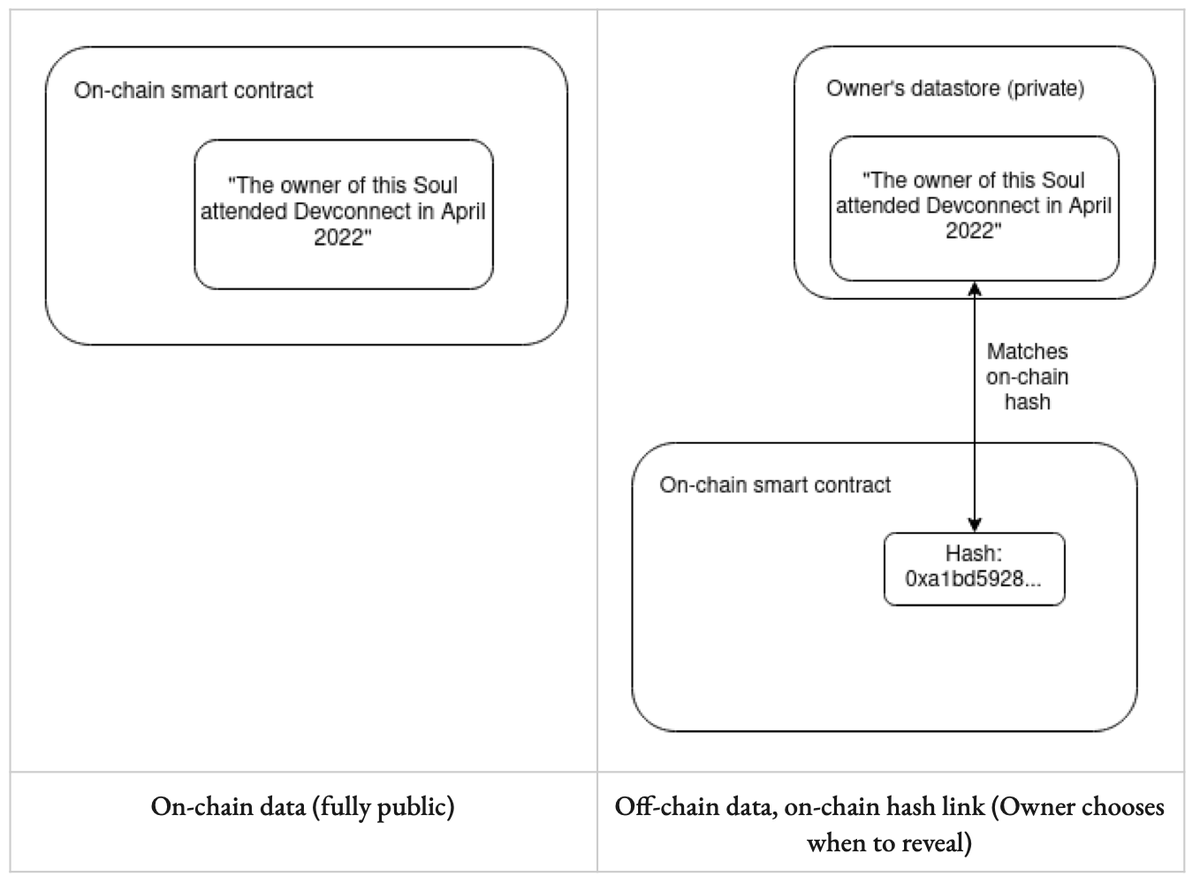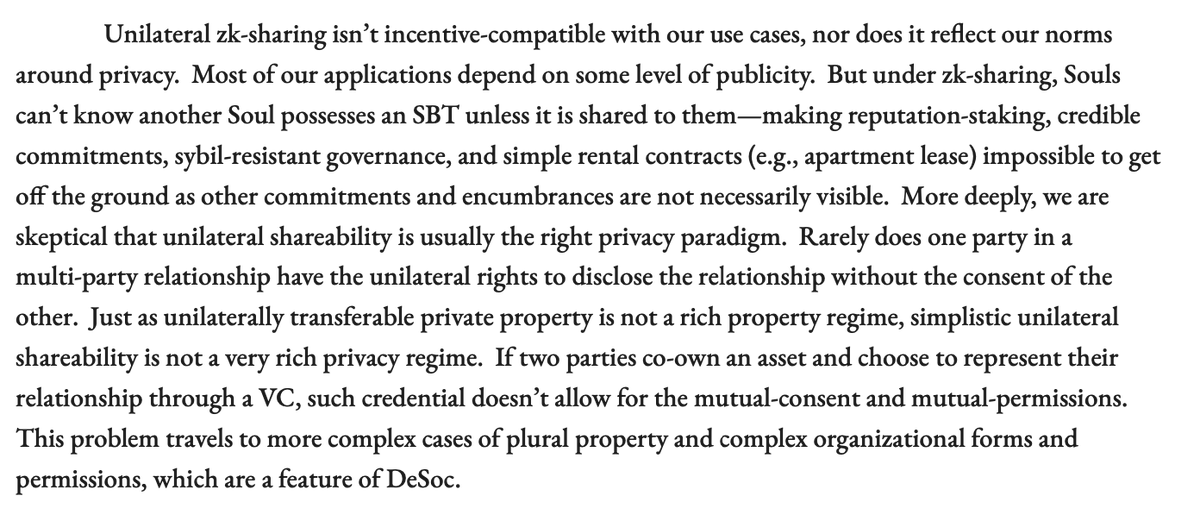
1/ Soul Bound Tokens (SBTs): verifiable credentials with better branding (?) but much worse privacy behaviour
Strange to see this from @VitalikButerin given he co-authored a paper which forms a component of self-sovereign identity (SSI):
danubetech.com/download/dpki.…
Strange to see this from @VitalikButerin given he co-authored a paper which forms a component of self-sovereign identity (SSI):
danubetech.com/download/dpki.…
https://twitter.com/iamjasonlevin/status/1527316023614918656
2/ Let’s first take some of the use-cases in the paper:
- University degrees: Already done using VCs by @IdentityRamp
- Certifications: being rolled out for doctors by @truu_id, @CondatisUK & @evernym amongst others
Not soon to come, either done or being productionised
- University degrees: Already done using VCs by @IdentityRamp
- Certifications: being rolled out for doctors by @truu_id, @CondatisUK & @evernym amongst others
Not soon to come, either done or being productionised

3/ Or another:
Issuing credentials to attendees of a conference. This was done around 4 years ago by @esatus_SOWL, @trinsic_id amongst others at #InternetIdentityWorkshop
Issuing credentials to attendees of a conference. This was done around 4 years ago by @esatus_SOWL, @trinsic_id amongst others at #InternetIdentityWorkshop

4/ Starting the paper, we’re only on page 2 when we hit privacy issues with building something net-new for problems which have already been solved. I would argue there is nothing about me I would feel comfortable writing onto an immutable-ledger. 

5/ I would instead argue that the default should be privacy unless disclosure is desired. Even then, not onto an immutable ledger. The thinking behind SBTs appears to be the reverse.
Let’s take the potential to hash data onto the ledger.
Let’s take the potential to hash data onto the ledger.

6/ Written by the European Parliament Research Service in 2019, the following still stands (page II).
europarl.europa.eu/RegData/etudes…
europarl.europa.eu/RegData/etudes…

7/ Key except on Page 30:
“the mere use of a hash function will not automatically transform personal data into anonymous data“
The #SSI community moved away from this direction around 5 years ago for exactly this reason.
“the mere use of a hash function will not automatically transform personal data into anonymous data“
The #SSI community moved away from this direction around 5 years ago for exactly this reason.
8/ Writing personal data to the ledger is typically driven by trying to increase the throughput on the network and hence the fees that can be captured via gas rather than optimising for the system as a whole, i.e. privacy and high throughput.
9/ When SBTs are compared against VCs, good work is seemingly thrown away despite the ability of the technology to extend to solve the issues levelled at it:
- Community recovery paradigm
- VCs being optimised for unilateral privacy
Let’s take these one by one.
- Community recovery paradigm
- VCs being optimised for unilateral privacy
Let’s take these one by one.

10/ Community recovery paradigm.
Using VCs, this can be achieved using Shamir Secret Sharing where a key is split into parts with a threshold of the parts needed for recover:
en.wikipedia.org/wiki/Shamir%27…
Using VCs, this can be achieved using Shamir Secret Sharing where a key is split into parts with a threshold of the parts needed for recover:
en.wikipedia.org/wiki/Shamir%27…
11/ For DeSoc it may be desirable to have a community recovery mechanism. For most people however, a more typical account recovery mechanism is perfectly fine (assuming it is appropriately secure).
12/ VCs being optimised for unilateral privacy.
This is a bit more interesting but could be achieved by agents which interact with multiple wallets or accounts.
Definition of #SSI agents available here:
freecontent.manning.com/the-basic-buil…
This is a bit more interesting but could be achieved by agents which interact with multiple wallets or accounts.
Definition of #SSI agents available here:
freecontent.manning.com/the-basic-buil…

13/ The reality is most use-cases have unilateral privacy models, e.g. decentralised lending, it is the users decision on what they publicise. Whilst the counterpart or protocol may request information, it is entirely the person’s decision to agree and reveal that information.
14/ Wrapping this up, SBTs seem to be coming from the opposite privacy paradigm from #SSI which could have some dangerous unintended consequences:
- DeSoc being public-by-default in terms of philosophy
- As a result, publishing data on-ledger in public for better or for worse
- DeSoc being public-by-default in terms of philosophy
- As a result, publishing data on-ledger in public for better or for worse
16/ P.S. What throws me is the lack of depth in analysing alternatives before rejecting them and going net-new. Solved or solvable issues are treated as terminal which makes me think the solution came before the problem.
If there is a more detailed analysis, I’d love to see it!
If there is a more detailed analysis, I’d love to see it!
17/ Stream of consciousness, maybe the problem was “What token concept will drive the next bull market”?
Hey @iamjasonlevin, @tweezers0xffff wanted to tag you both since I made such heavy use of your tweets (thanks for the breakdown!). Would love to know your thoughts / feedback on anything I'm missing (maybe the whole thing?).
• • •
Missing some Tweet in this thread? You can try to
force a refresh





